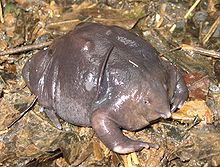Nasikabatrachus is a genus of frogs. It is presently treated as the only genus in the family Nasikabatrachidae, though previously it was included in the family Sooglossidae. Two species are recognized, Nasikabatrachus bhupathi and Nasikabatrachus sahyadrensis, both endemic to southwestern India.[1] Both Nasikabatrachidae and Sooglossidae are thought to be the only extant families of the superfamily Sooglossoidea.[2][3]
| Nasikabatrachus | |
|---|---|

| |
| Nasikabatrachus sahyadrensis | |
| Scientific classification | |
| Domain: | Eukaryota |
| Kingdom: | Animalia |
| Phylum: | Chordata |
| Class: | Amphibia |
| Order: | Anura |
| Superfamily: | Sooglossoidea |
| Family: | Nasikabatrachidae Biju & Bossuyt, 2003 |
| Genus: | Nasikabatrachus Biju & Bossuyt, 2003 |
| Species | |
With its closest relatives in the Seychelles, Nasikabatrachus is thought to have evolved separately since the end of the Cretaceous. Its discovery added to the evidence that Madagascar and the Seychelles separated from the Indian landmass sometime well after the breakup of Gondwana had started.[2][4]
Reproduction
editThe purple frog is an explosive seasonal breeder species which completes its development in ephemeral streams. Its breeding activities typically take place during the months of April and May, which is during the pre-monsoon shower.[4]
References
edit- ^ "Nasikabatrachidae Biju and Bossuyt, 2003 | Amphibian Species of the World". amphibiansoftheworld.amnh.org. Retrieved 2022-09-13.
- ^ a b Feng, Yan-Jie; Blackburn, David C.; Liang, Dan; Hillis, David M.; Wake, David B.; Cannatella, David C.; Zhang, Peng (18 July 2017). "Phylogenomics reveals rapid, simultaneous diversification of three major clades of Gondwanan frogs at the Cretaceous–Paleogene boundary". Proceedings of the National Academy of Sciences. 114 (29): E5864–E5870. Bibcode:2017PNAS..114E5864F. doi:10.1073/pnas.1704632114. PMC 5530686. PMID 28673970.
- ^ Dubois, Alain (July 2005). "Amphibia Mundi. 1.1. An ergotaxonomy of recent amphibians". Alytes. 23 (1/2): 1–24. INIST 16956204 ProQuest 1319774213.
- ^ a b Biju, S. D.; Bossuyt, F. (2003). "New frog family from India reveals an ancient biogeographical link with the Seychelles". Nature. 425 (6959): 711–714. Bibcode:2003Natur.425..711B. doi:10.1038/nature02019. PMID 14562102. S2CID 4425593.